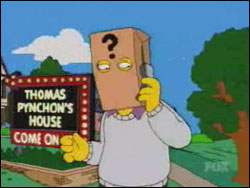In tonights episode of The Simpsons, Lisa and Moe go to a writer’s seminar called “Wordloaf” in Vermont. Is this a real thing? I googled, but I found nothing.
Moe has been invitedto Wordloaf by Tom Wolfe, who loves Moe’s book of poetry, Howling at a Concrete Moon. What Wolfe and the other writers at Wordloaf don’t realize is that Lisa has engineered Moe’s book, editing it together from Moe’s fragmented notes of despair, and giving it its title. Disappointment, betrayal, and humiliation ensues. Also, I think Homer might’ve eaten a donut or something.
Authors Jonathan Franzen (The Corrections) and Michael Chabon (Wonder Boys, The Amazing Adventures of Kavalier & Clay) also guest star. By the way, biblioklept is coming down here, officially, in complete disagreement with Jonathan Franzen’s opinions on “difficult writing.”

Thomas Pynchon’s non-image makes a brief cameo. By my count this is his third appearance on the show.
Overall, despite jokes about grading papers and grad school and several obscure literary references–all things so dear to my heart–this episode was not so funny.

Wordloaf in Vermont actually is a spoof on the famous Bread Loaf Writer’s Conference held on the Bread Loaf Mountain Campus in Middlebury Vermont. This is the nation’s oldest writer’s conference. Robert Frost lived for 40 years about one mile from the campus. I believe that the Simpsons have some additional connection to Middlebury College (which is what Bread Loaf is a part of). In the episode “22 short films about Springfield”, Snake is wearing a Middlebury shirt. Perhaps one of the writers is a grad or has some other connection.
LikeLike
Thanks for the enlightening info, Andy.
LikeLike
[…] This blog has previously come out against Franzen’s argument: biblioklept is a fan of both the difficult and the more accessible–and the work of authors like Eggers and DFW prove that Franzen’s types are empty models. It’s too bad for Franzen that Gravity’s Rainbow and Ulysses require more work on the part of the reader than say, Stephen King or Tom Clancy. The Bible and Shakespeare and Moby Dick and Gabriel García Márquez also require work from the reader, and no one could make a legitimate argument for removing them from the literary canon. One day, Infinite Jest will take its place in that same canon, alongside the work of Pynchon, John Barth and Don DeLillo–all authors whose work requires some effort on the part of the reader. […]
LikeLike